You have /5 articles left.
Sign up for a free account or log in.
 The Fourth Age: Smart Robots, Conscious Computers, and the Future of Humanity by Byron Reese
The Fourth Age: Smart Robots, Conscious Computers, and the Future of Humanity by Byron Reese
Published in April of 2018.
Some questions that college students should be asking themselves include:
- Will I be able to graduate in a reasonable amount of time? (Four in 10 first-time, full-time undergraduates will not graduate within six years).
- How will I manage my student debt? (The average student borrower owes over $37,000).
- Will I be able to get a good job that leads to a career. (Four in 10 graduates get a job that does not require a degree, and two-thirds are not on a professional career track in their 20s).
Questions that college students don’t need to spend much energy worrying about are:
- Will robots take all the jobs?
- Will a sentient artificial intelligence (AI) emerge and then decide to kill us all?
Oddly, I think that many college students spend more time worrying about robots stealing jobs and genocidal AIs than about finishing school, paying their loans and figuring out a career.
This is our fault. The adults in the higher ed room (us) have transferred our fears and insecurities about the future of technology to our students.
An excellent place to start in getting this right with our students is to find a way to have as many people on our campuses, students and educators alike, read and discuss The Fourth Age.
The story of the future of robotics and AI is complicated. Reese does not simplify. He has lots to say about how smart machines will shape the labor market.
While Reese is strongly optimistic that smart robots (a catchall phrase for everything from self-driving cars to automated factories to decision support systems) will benefit humanity, he does not deny that there will be costs and challenges.
Every technological revolution displaces many humans who make their living through old technologies. At the beginning of the 19th century, over 80 percent of the US labor market was employed in agriculture. Today, thanks to mechanization and fertilizer and other technologies that have boosted agricultural productivity, that number is less than 2 percent.
Technology changed farming, and the farmers got other (and better) jobs.
The Fourth Age deals with challenging concepts such as consciousness and intelligence in ways that are both accessible and connected to real-world concerns.
If I have any complaint about The Fourth Age, it is to wonder if the smart machines that Reese writes about are coming quickly enough? Reese is optimistic that enormous technology-driven economic and social changes will happen by the middle of this century. I’m not so sure.
It is not clear to me that AI progress obeys anything like a Moore’s Law. The challenges of using sensors, big data, and fast processing to create truly useful robots (including self-driving vehicles) may be bigger than we think.
How will we get to smart machines if we can’t seem to get a conference projector to work reliably, or the webcam and microphone on a web conference to operate reliably for all participants?
Reese’s next book should move on from debunking our worries about bad AI and job-stealing robots and instead focus on taking a hard look as to why the age of smart robots seems to be arriving so slowly.
Do you think that we are on the cusp of a new age?
What are you reading?




